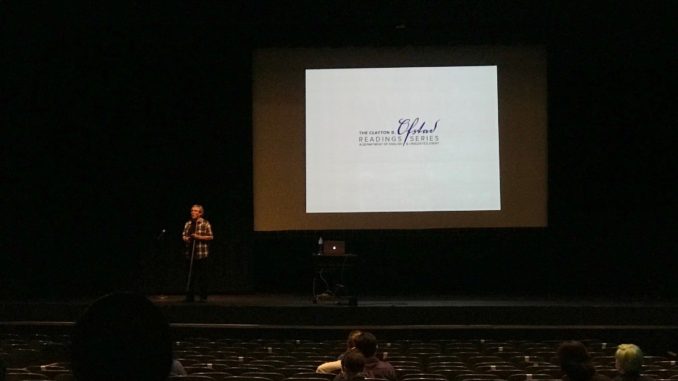
Cartoons aren’t often thought of as scholarly. In fact, they’re frequently met with academic disapproval, even disdain — but not for comics theorist Scott McCloud. As the first of several Visiting Ofstad scholars this fall, McCloud sparked critical thinking through the frame of graphics and illustration.
The Clayton B. Ofstad Endowed Chair funds campus appearances from scholars specializing in topics relevant to English, linguistics and creative writing. Though McCloud’s work might not seem directly applicable to those fields, the program looks for diversity in academic expertise. Mary Shapiro, English and linguistics department chair, explained that she enjoys the ability to choose from a wide variety of research backgrounds so students can be exposed to perspectives beyond their typical lessons, such as McCloud’s.
“It’s good for everybody to have broader offerings,” Shapiro said. “It’s exciting to have these well-known people that we as faculty get excited about interacting with … It is a really flexible program and I really thank the Ofstad family for creating it to be so flexible, because we can bring in anybody on any topic that we think our students will relate to.”
At his Aug. 21 lecture and weekend workshops, McCloud conveyed his message through the medium he knows best: visual storytelling. The presentation mainly demonstrated his theory of “amplification through simplification,” a concept encouraging the creation and search of signals through noise.
His defense of comic reading and analysis, however, is what struck Shapiro as most pertinent to attendees.
“No disrespect to the classic, great books — they’re classic for a reason and we love them — but what we study is so much broader than that,” Shapiro said. “The idea that comic books are books, and they are texts that we can study … I think maybe the idea that you can really love and have fun with some of the stuff you’re studying and take it seriously at the same time. One doesn’t prevent the other.”
McCloud employed this attitude at his presentation to stress that, contrary to what many have been taught through conventional schooling, words are not always superior to images — a potentially eye-opening proposal for an audience specializing in the study of written craft.
Listen to this week’s episode of Dry Ink on this story
Emphasis on visual awareness guided the majority of Friday’s talk, highlighting the differing weights of pictures and the faulty nature of word-first bias. A mix of rhetorical thought and comedy brought both awe and laughter to the socially-distanced crowd as he identified design confusion in common signage, advertising material and everyday items.
“The words, if in any particular language, will only be understood by a small subset of the world’s population.” McCloud said. “An image [that is] properly chosen can be understood by anyone who functions visually, which is the vast majority of the population … so maybe the image should come first.”
McCloud went on to describe how word-first bias can damage society if images are simply utilized to fill space and not properly considered. Designs can alter learning processes, exert subconscious influence and lead to safety hazards if not considered as crucial as words, he explained. Similar to the strategic choice of literary devices, McCloud noted that there are no neutral visual decisions when it comes to communicating a message.
Shapiro understood the importance of these notions when selecting McCloud to speak, knowing the potential for growth in students who attended.
“I do think there are really interesting theoretical issues between how you tell a story just with words, how you tell a story just with images — and the whole range of possibility in between,” Shapiro said. “I’m not sure a lot of the creative writers or the English majors or the linguists would usually confront that question. Writers are putting words on pages and the English majors are reading words on pages, so I hope this will push them a little out of their comfort zones as scholars.”
The program will look to host several more speakers throughout the school year with safety precautions and limited seating. Masks will be required, chairs will be marked and workshop attendance will be based on a lottery of applicable majors within and outside the department. To learn more about attending a Visiting Ofstad scholar lecture, contact Mary Shapiro at mshapiro@truman.edu.
